雅思常用语法总结
雅思写作语法大全
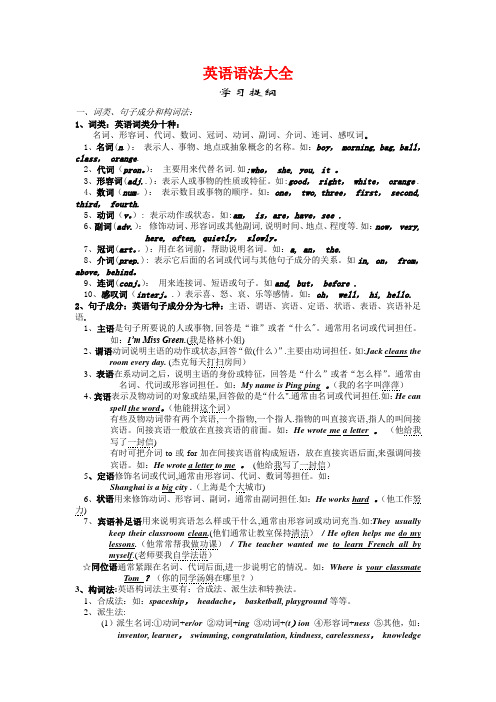
英语语法大全学习提纲一、词类、句子成分和构词法:1、词类:英语词类分十种:名词、形容词、代词、数词、冠词、动词、副词、介词、连词、感叹词。
1、名词(n.):表示人、事物、地点或抽象概念的名称。
如:boy, morning, bag, ball,class, orange.2、代词(pron。
):主要用来代替名词.如:who, she, you, it 。
3、形容词(adj..):表示人或事物的性质或特征。
如:good, right, white, orange .4、数词(num。
):表示数目或事物的顺序。
如:one, two, three, first, second, third, fourth.5、动词(v。
): 表示动作或状态。
如:am, is,are,have,see .6、副词(adv.):修饰动词、形容词或其他副词,说明时间、地点、程度等.如:now, very,here, often, quietly, slowly。
7、冠词(art。
):用在名词前,帮助说明名词。
如:a, an, the.8、介词(prep.): 表示它后面的名词或代词与其他句子成分的关系。
如in, on, from,above, behind。
9、连词(conj。
):用来连接词、短语或句子。
如and, but, before .10、感叹词(interj。
.)表示喜、怒、哀、乐等感情。
如:oh, well, hi, hello. 2、句子成分:英语句子成分分为七种:主语、谓语、宾语、定语、状语、表语、宾语补足语.1、主语是句子所要说的人或事物,回答是“谁”或者“什么"。
通常用名词或代词担任。
如:I’m Miss Green.(我是格林小姐)2、谓语动词说明主语的动作或状态,回答“做(什么)”.主要由动词担任。
如:Jack cleans theroom every day. (杰克每天打扫房间)3、表语在系动词之后,说明主语的身份或特征,回答是“什么”或者“怎么样”。
雅思考试基本句型
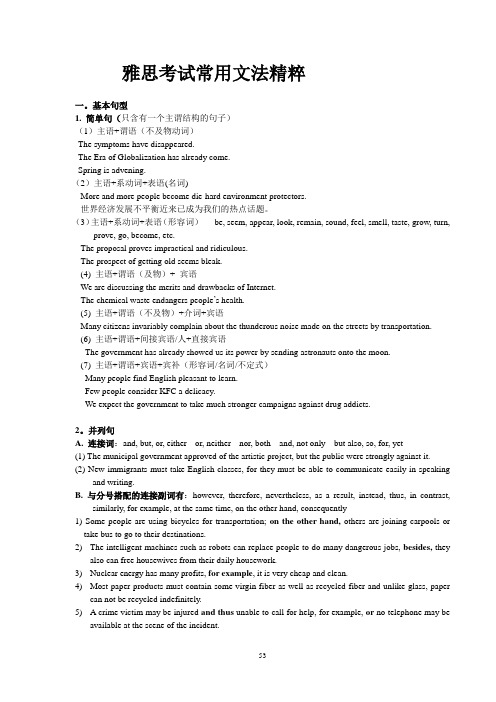
雅思考试常用文法精粹一。
基本句型1. 简单句(只含有一个主谓结构的句子)(1)主语+谓语(不及物动词)The symptoms have disappeared.The Era of Globalization has already come.Spring is advening.(2)主语+系动词+表语(名词)More and more people become die-hard environment protectors.世界经济发展不平衡近来已成为我们的热点话题。
(3)主语+系动词+表语(形容词)-----be, seem, appear, look, remain, sound, feel, smell, taste, grow, turn, prove, go, become, etc.The proposal proves impractical and ridiculous.The prospect of getting old seems bleak.(4) 主语+谓语(及物)+ 宾语We are discussing the merits and drawbacks of Internet.The chemical waste endangers people’s health.(5) 主语+谓语(不及物)+介词+宾语Many citizens invariably complain about the thunderous noise made on the streets by transportation. (6) 主语+谓语+间接宾语/人+直接宾语The government has already showed us its power by sending astronauts onto the moon.(7) 主语+谓语+宾语+宾补(形容词/名词/不定式)Many people find English pleasant to learn.Few people consider KFC a delicacy.We expect the government to take much stronger campaigns against drug addicts.2。
雅思作文常用句型15个
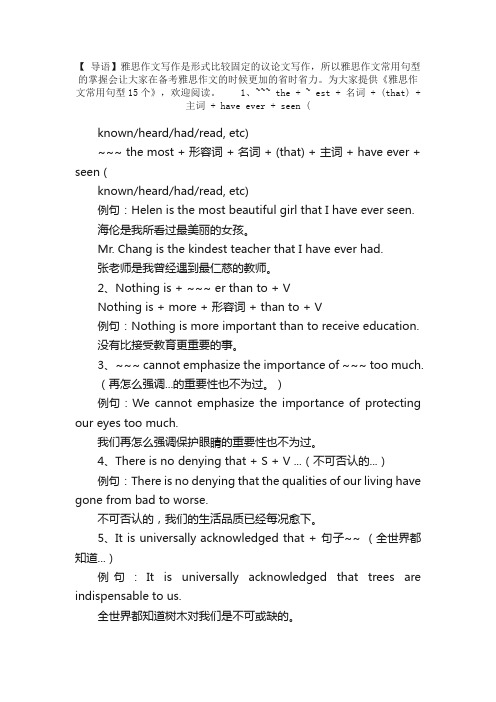
【导语】雅思作文写作是形式比较固定的议论文写作,所以雅思作文常用句型的掌握会让大家在备考雅思作文的时候更加的省时省力。
为大家提供《雅思作文常用句型15个》,欢迎阅读。
1、~~~ the + ~ est + 名词 + (that) +主词 + have ever + seen (known/heard/had/read, etc)~~~ the most + 形容词 + 名词 + (that) + 主词 + have ever + seen (known/heard/had/read, etc)例句:Helen is the most beautiful girl that I have ever seen.海伦是我所看过最美丽的女孩。
Mr. Chang is the kindest teacher that I have ever had.张老师是我曾经遇到最仁慈的教师。
2、Nothing is + ~~~ er than to + VNothing is + more + 形容词 + than to + V例句:Nothing is more important than to receive education.没有比接受教育更重要的事。
3、~~~ cannot emphasize the importance of ~~~ too much.(再怎么强调...的重要性也不为过。
)例句:We cannot emphasize the importance of protecting our eyes too much.我们再怎么强调保护眼睛的重要性也不为过。
4、There is no denying that + S + V ...(不可否认的...)例句:There is no denying that the qualities of our living have gone from bad to worse.不可否认的,我们的生活品质已经每况愈下。
雅思 语法
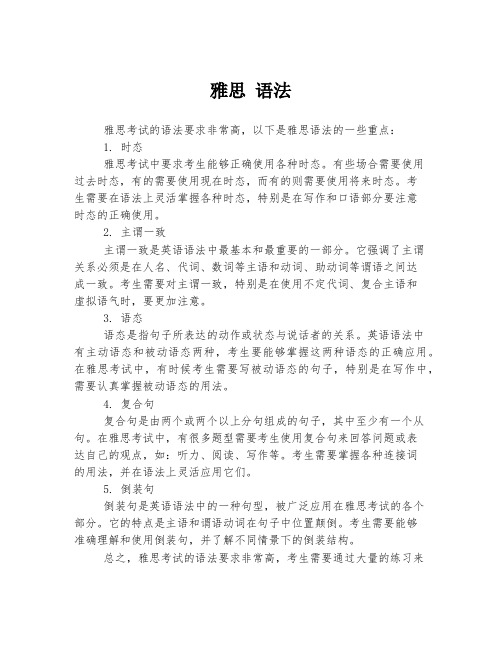
雅思语法
雅思考试的语法要求非常高,以下是雅思语法的一些重点:
1. 时态
雅思考试中要求考生能够正确使用各种时态。
有些场合需要使用
过去时态,有的需要使用现在时态,而有的则需要使用将来时态。
考
生需要在语法上灵活掌握各种时态,特别是在写作和口语部分要注意
时态的正确使用。
2. 主谓一致
主谓一致是英语语法中最基本和最重要的一部分。
它强调了主谓
关系必须是在人名、代词、数词等主语和动词、助动词等谓语之间达
成一致。
考生需要对主谓一致,特别是在使用不定代词、复合主语和
虚拟语气时,要更加注意。
3. 语态
语态是指句子所表达的动作或状态与说话者的关系。
英语语法中
有主动语态和被动语态两种,考生要能够掌握这两种语态的正确应用。
在雅思考试中,有时候考生需要写被动语态的句子,特别是在写作中,需要认真掌握被动语态的用法。
4. 复合句
复合句是由两个或两个以上分句组成的句子,其中至少有一个从句。
在雅思考试中,有很多题型需要考生使用复合句来回答问题或表
达自己的观点,如:听力、阅读、写作等。
考生需要掌握各种连接词
的用法,并在语法上灵活应用它们。
5. 倒装句
倒装句是英语语法中的一种句型,被广泛应用在雅思考试的各个
部分。
它的特点是主语和谓语动词在句子中位置颠倒。
考生需要能够
准确理解和使用倒装句,并了解不同情景下的倒装结构。
总之,雅思考试的语法要求非常高,考生需要通过大量的练习来
巩固和提高自己的语法水平。
只有在语法正确的基础上,才能获得更高的雅思分数。
雅思口语语法知识点总结

雅思口语语法知识点总结一、一般现在时:一般现在时表示经常性或习惯性的动作,或陈述现在的事实、真理、心得体会等。
1. 关于第三人称单数形式,一般动词加s。
例如:She goes to school every day.2. 并不是所有单词在加s或es,不规则变化。
例子:I go to school every day.二、一般过去时:一般过去时表示过去某个时间发生的动作或已经完成的动作。
1. 一般动词变化为过去式。
例如:I went to school yesterday.2. 动词to be的过去式。
例如:He was at home yesterday.三、现在进行时:现在进行时表示现在进行的动作。
1. 动词to be的现在进行时。
例如:He is playing basketball now.2. 现在分词短语。
例如:She is studying in her room.四、过去进行时:过去进行时表示在过去某个时间正在进行的动作。
1. 动词to be的过去进行时。
例如:She was cooking dinner when I arrived home.2. 过去分词短语。
例如:We were watching TV at 8 o'clock last night.五、一般将来时:一般将来时表示将来某个时间要发生的动作或已经预定好的事情。
1. 动词will。
例如:I will visit my family next week.2. 动词going to。
例如:She is going to start a new job next month.3. 现在进行时。
例如:We are leaving for the airport at 3 o'clock.六、现在完成时:现在完成时表示过去某个时间开始,一直持续到现在的动作或者发生的动作与现在相关。
1. 动词have/has。
雅思语法 ppt课件
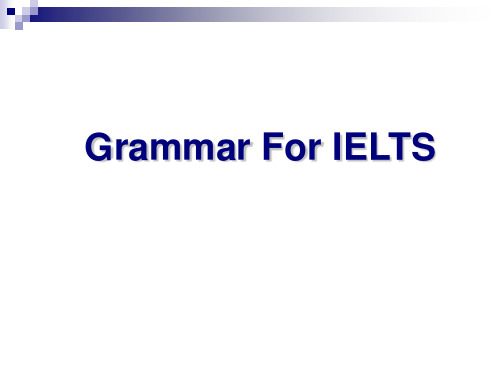
语法的主流趋势
我要喝点东西。 I want a drink.
a water, a beer, a coffee 创新是必须的。 Innovation is a must.
语法在“进化”
1. 句子成分: 主谓宾+定状补 2. 简单句:五大基本句型 3. 并列句 4. 复合句: 宾语从句,定语从句,状语从句 5. 动词四类和五大基本时态
165
IELTS 7 99
112
94
101
TOTAL
雅思写作
雅思写作 并列句
2009 15
定语从句 状语从句 名词性从 句(主宾 表同)
8
7
36
2008 17
9
10
39
Grammar & vocabulary
Grammar 无规矩不成方圆
Vocabulary 巧妇难为无米之炊
Reading > > >Writing Listening > > >Speaking
及物动词,直接跟宾语,如 eat, drink, know, play, watch
不及物动词,可以不直接跟宾语, 如 jump, sit, stand, think, sleep, wait, die, fight, run, live
情态动词或其他助动词加动词原形 系动词 如 am, is , are
9. I‘m not sure____if_/w_h_e_t_h_er_i_t _w_il_l b_e__su_n_n_y_t_o_m_o_r_ro_w_______(明天天 气是否晴朗)
10.He asked me_____w_h_a_t_I_d_id__w_it_h_th_e__m_a_tt_e_r ___________(是如何 处理这件事的)
雅思阅读中的100个高频短语词组
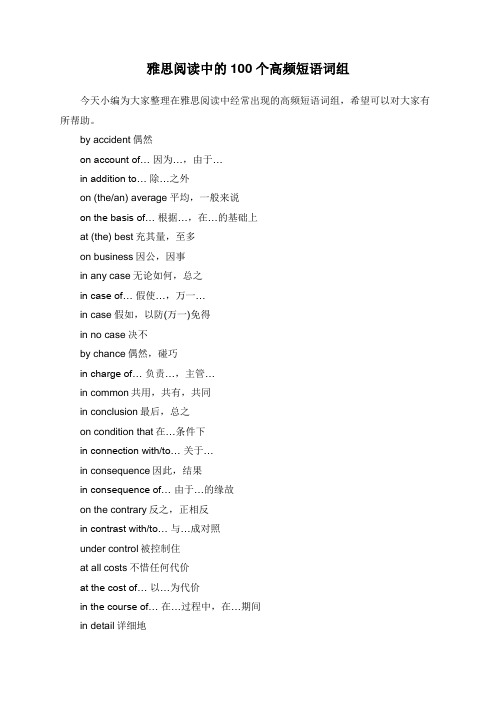
雅思阅读中的100个高频短语词组今天小编为大家整理在雅思阅读中经常出现的高频短语词组,希望可以对大家有所帮助。
by accident偶然on account of… 因为…,由于…in addition to… 除…之外on (the/an) average平均,一般来说on the basis of… 根据…,在…的基础上at (the) best充其量,至多on business因公,因事in any case无论如何,总之in case of… 假使…,万一…in case假如,以防(万一)免得in no case决不by chance偶然,碰巧in charge of… 负责…,主管…in common共用,共有,共同in conclusion最后,总之on condition that在…条件下in connection with/to… 关于…in consequence因此,结果in consequence of… 由于…的缘故on the contrary反之,正相反in contrast with/to… 与…成对照under control被控制住at all costs不惜任何代价at the cost of… 以…为代价in the course of… 在…过程中,在…期间in detail详细地in difficulties处境困难on earth究竟,到底at all events无论如何in any event无论如何in effect实际上with the exception of… 除…之外in the face of… 面对…,不顾…in favor of… 有利于…,赞成…,支持…in general通常,大体上at heart在内心,实质上in honor of… 为纪念…,向…表示敬意at intervals不时,时时at length终于,最后,详细地at a loss困惑,不知所措by all means无论如何,必定by means of… 借助于…,用…by no means决不by mistake错误地in nature本质上on occasion有时,不时in particular特别地,尤其,详细地in the first place起初,首先in the last place最后in practice实际上at present目前,现在in proportion to… 与…成比例for (the) purpose of… 为了…on purpose故意,有意at random随意地,任意地at any rate无论如何,至少by reason of… 由于…with/in regard to… 对于…,就…而论with respect to… 关于…as a result结果,因此as a result of… 由于…的缘故in the long run最终,从长远观点看for the sake of… 为了…起见at first sight乍一看,初看起来in spite of… 不管…,不顾…in terms of… 依据…,按照…on the second thoughts经重新考虑,一转念from time to time有时,不时in truth事实上,实际上,的确on the whole总的来说have/gain access to…可以获得…take...into account把…加以考虑gain/have an advantage over…胜过…,优于…take advantage of…利用…,趁…之机make the best of…充分利用…,妥善处理…take charge of…担任…,负责…make a/the difference有影响,很重要carry/bring into effect使生效,使起作用put into effect实行,生效come/go into effect生效,实施keep an eye on…留意…,照看…bear/keep in mind记住make up one’s mind下决心。
雅思语法知识点总结
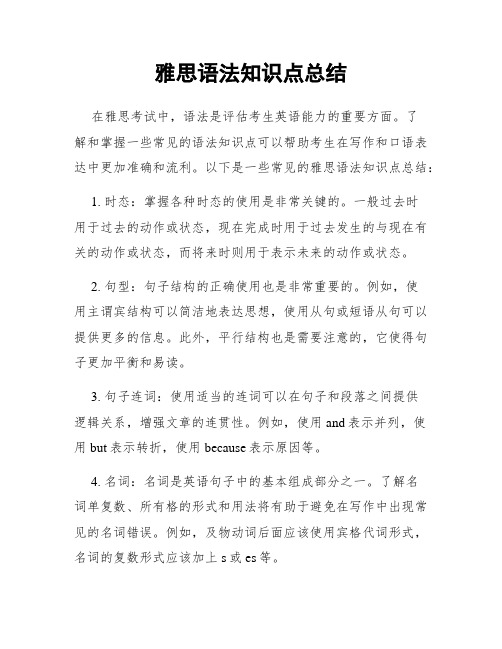
雅思语法知识点总结在雅思考试中,语法是评估考生英语能力的重要方面。
了解和掌握一些常见的语法知识点可以帮助考生在写作和口语表达中更加准确和流利。
以下是一些常见的雅思语法知识点总结:1. 时态:掌握各种时态的使用是非常关键的。
一般过去时用于过去的动作或状态,现在完成时用于过去发生的与现在有关的动作或状态,而将来时则用于表示未来的动作或状态。
2. 句型:句子结构的正确使用也是非常重要的。
例如,使用主谓宾结构可以简洁地表达思想,使用从句或短语从句可以提供更多的信息。
此外,平行结构也是需要注意的,它使得句子更加平衡和易读。
3. 句子连词:使用适当的连词可以在句子和段落之间提供逻辑关系,增强文章的连贯性。
例如,使用and表示并列,使用but表示转折,使用because表示原因等。
4. 名词:名词是英语句子中的基本组成部分之一。
了解名词单复数、所有格的形式和用法将有助于避免在写作中出现常见的名词错误。
例如,及物动词后面应该使用宾格代词形式,名词的复数形式应该加上s或es等。
5. 代词:代词用于替代名词,可以使句子更加紧凑和准确。
但是,在使用代词时需要注意其指代的清晰性,避免产生歧义。
此外,还要注意代词的人称和数的一致性。
6. 介词:介词是表达时间、地点、方式等意义的重要词类。
正确使用介词可以使句子更加清晰和准确。
一些常见的介词包括in、on、at、for、with等。
7. 形容词和副词:形容词用于描述名词,副词用于修饰动词、形容词或其他副词。
掌握形容词和副词的比较级和最高级形式以及其正确的位置和用法将有助于提升句子的表达能力。
8. 否定和疑问句:了解和使用否定句和疑问句的正确形式对于雅思考试至关重要。
对于否定句,常使用not来否定谓语动词;对于疑问句,一般将助动词或情态动词提到句首。
以上是一些常见的雅思语法知识点总结。
通过熟练掌握这些知识点,并在练习和实践中加以应用,考生可以提高自己的语法水平,更好地应对雅思考试。
雅思必背100句,含分析

雅思必背的长句100句(有分析的)1. Typical of the grassland dwellers of the continent is the American antelope, or pronghorn.(“主-系-表”结构,倒装句。
)2. Of the millions who saw Haley's comet in 1986, how many people will live long enough to see it return in the twenty-first century?(of 介词短语提前到句首,起强调作用,“常规位置”应在主谓之间,即people与will live之间。
)3. Anthropologists have discovered that fear, happiness, sadness and surprise are universally reflected in facial expressions.(含有宾语从句的主从复合句,主句为现在完成时,从句为一般现在时被动语态。
)4. Because of its irritating effect on humans, the use of phenol as a general antiseptic has been largely discontinued.(简单句,现在完成时,被动语态,because of 介词短语作原因状语。
)5. In order to remain in existence, a profit-making organization must, in the long run, produce something consumers consider useful or desirable.(含有定语从句的主从复合句,定语从句的引导词that在从句中作consider的宾语,故省略,useful or desirable 是形容词作宾语补足语;in order to do sth. 是不定式短语作目的状语的强调形式;in the long run 意为“长远看来”/“最终”。
最新雅思英语语法专题复习(附练习答案)
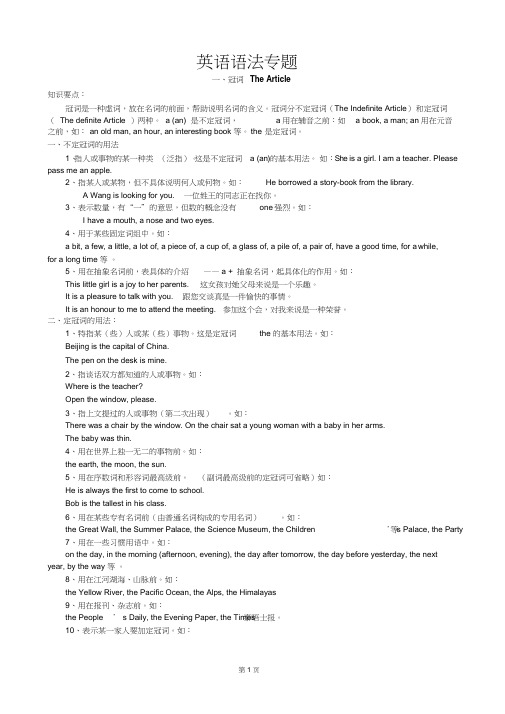
知识要点:英语语法专题一、冠词The Article冠词是一种虚词,放在名词的前面,帮助说明名词的含义。
冠词分不定冠词(The Indefinite Article)和定冠词(The definite Article )两种。
a (an) 是不定冠词, a 用在辅音之前:如 a book, a man; an 用在元音之前,如:an old man, an hour, an interesting book 等。
the 是定冠词。
一、不定冠词的用法1、指人或事物的某一种类(泛指)。
这是不定冠词 a (an)的基本用法。
如:She is a girl. I am a teacher. Please pass me an apple.2、指某人或某物,但不具体说明何人或何物。
如:He borrowed a story-book from the library.A Wang is looking for you. 一位姓王的同志正在找你。
3、表示数量,有“一”的意思,但数的概念没有one 强烈。
如:I have a mouth, a nose and two eyes.4、用于某些固定词组中。
如:a bit, a few, a little, a lot of, a piece of, a cup of, a glass of, a pile of, a pair of, have a good time, for a while,for a long time 等。
5、用在抽象名词前,表具体的介绍——a + 抽象名词,起具体化的作用。
如:This little girl is a joy to her parents. 这女孩对她父母来说是一个乐趣。
It is a pleasure to talk with you. 跟您交谈真是一件愉快的事情。
It is an honour to me to attend the meeting. 参加这个会,对我来说是一种荣誉。
雅思写作从句语法解析大全
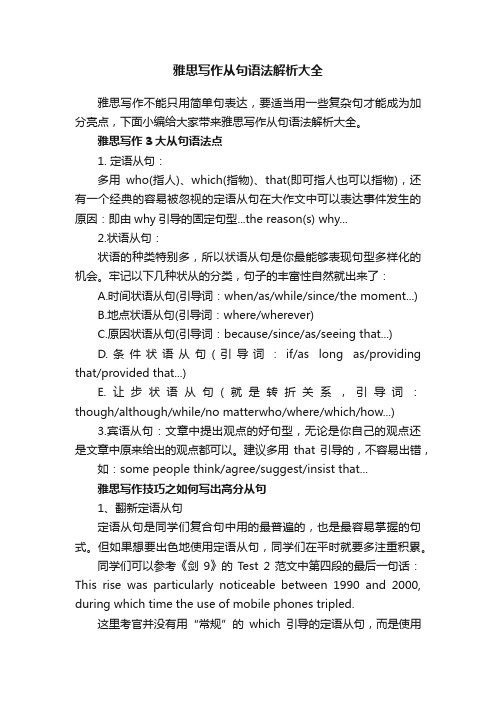
雅思写作从句语法解析大全雅思写作不能只用简单句表达,要适当用一些复杂句才能成为加分亮点,下面小编给大家带来雅思写作从句语法解析大全。
雅思写作3大从句语法点1. 定语从句:多用who(指人)、which(指物)、that(即可指人也可以指物),还有一个经典的容易被忽视的定语从句在大作文中可以表达事件发生的原因:即由why引导的固定句型...the reason(s) why...2.状语从句:状语的种类特别多,所以状语从句是你最能够表现句型多样化的机会。
牢记以下几种状从的分类,句子的丰富性自然就出来了:A.时间状语从句(引导词:when/as/while/since/the moment...)B.地点状语从句(引导词:where/wherever)C.原因状语从句(引导词:because/since/as/seeing that...)D.条件状语从句(引导词:if/as long as/providing that/provided that...)E.让步状语从句(就是转折关系,引导词:though/although/while/no matterwho/where/which/how...)3.宾语从句:文章中提出观点的好句型,无论是你自己的观点还是文章中原来给出的观点都可以。
建议多用that引导的,不容易出错,如:some people think/agree/suggest/insist that...雅思写作技巧之如何写出高分从句1、翻新定语从句定语从句是同学们复合句中用的最普遍的,也是最容易掌握的句式。
但如果想要出色地使用定语从句,同学们在平时就要多注重积累。
同学们可以参考《剑9》的T est 2范文中第四段的最后一句话:This rise was particularly noticeable between 1990 and 2000, during which time the use of mobile phones tripled.这里考官并没有用“常规”的which引导的定语从句,而是使用了“介词+关系词”的方式,使得句子变得高大上了许多。
雅思写作常见10大语法错误归纳总结

【写作语法】雅思写作常见10大语法错误归纳总结一、不一致所谓不一致不光指主谓不一致,还包括了数的不一致、时态不一致以及代词不一致等。
如:When one have money, he can dowhat he want to.分析:one是第三人称单数,因此本句的have应改为has;want应改为wants, 本句是典型的主谓不一致。
改为:When one has money, he can do what he wants (to do).二、修饰语错位英语与汉语不同,同一个修饰语置于句子不同的位置,句子的含义可能引起变化。
对于这一点考生们往往没有引起足够的重视,因而造成了不必要的误解。
比如:Ibelieve I can do it well and I will better know the world outside thecampus.分析:better位置不当,应置于句末。
三、句子不完整在口语中,交际双方可借助手势语气上下文等,不完整的句子完全可以被理解。
可是书面语就不同了,句子结构不完整会令意思表达不清,这种情况常常在主句写完以后,作者又想加些补充说明时发生。
比如:Thereare many ways to know the society. For example by TV, radio, newspaper and soon.分析:本句后半部分”For example by TV, radio, newspaper and soon.”不是一个完整的句子,仅为一些不连贯的词语,不能独立成句。
改为:There are many ways to know society,for example, by TV, radio, andnewspaper.四、悬垂修饰语所谓悬垂修饰语是指句首的短语与后面句子的逻辑关系混乱不清。
比如:At the age of ten, my grandfather died.这句中”at the age of ten”只写出十岁时,但没有说明“谁”十岁时,按一般推理不可能是my grandfather,如果我们把这个悬垂修饰语改得明确一点,读者或考官在读句子时就不会误解了。
雅思英语语法讲义
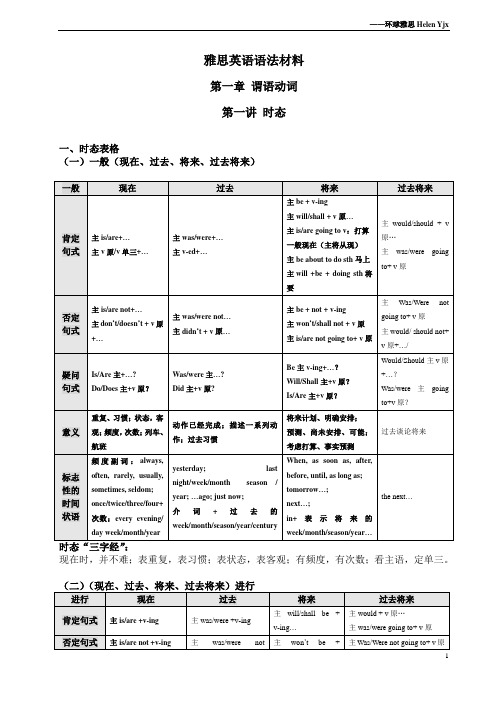
雅思英语语法材料第一章谓语动词第一讲时态一、时态表格(一)一般(现在、过去、将来、过去将来)现在时,并不难;表重复,表习惯;表状态,表客观;有频度,有次数;看主语,定单三。
(三)(现在、过去、将来、过去将来)完成(四)(现在、过去、将来、过去将来)完成进行二、基本时态演练Listening to the following conversation.(一) Task One: fill in the blanks.1. Interviewer: Your name?Peter: Peter __________. (1)2. Interviewer: ________ (2) you work or _________ (3) you a student?Peter: I’m studying really hard for my exams this month—I’m doing math’s at university—but I also________ (4) my parents out. They own a _________ (5) and I ________ (6) there as a waiter in the evenings, so I ____________ (7) a lot of free time during the week.My mom is always saying that I _____________ (8) enough in the restaurant! But I do manage to find some free time most days.3. Interviewer: Can you look at the _____ (9) and tell me whether you do any of these things and if so, how ____ (10)?Peter: I love music and I’m learning to play the piano. I ______ (11) really early and practice for an hour or so just about every day. I also play the guitar in a band with some other friends. We used to practice together at least _____________ (12) a week but these days we only manager to meet about once __________________ (13).4. Interviewer: What about the next thing on the list? -_________________ (14)?Peter: Well, I used to play them all the time but now I’m too busy studying and I _______ (15) miss them at all.5. Interviewer: Do you use a computer for other things?Peter: I use the Internet just about ________ (16) for my studies. And I also use it to _____________ (17) my friends and my family. My cousin is living in Thailand at the moment and he _______ (18) me regular emails to let me know how much fun he’s having! He’s always visiting exciting places.6. Interviewer: Now, how about _________________ (19)?Peter: Actually, I joined the local football team when I was at school and I still play _______________ (20) provided I can get to training. I much prefer playing football to watch it on TV, though I do ______________ (21) watch a match if there’s a big final or something.7. Interviewer: What about going to watch live matches?Peter: I’d love to be able to afford to go every week because I ____________ (22) my local team, but students don’t ____________ (23) have much money, you know! I can remember the ___________ (24) I went to a live match. Oh, sorry, I can see my friends—I ____________ (25)go now!(二)Task TwoRead through the conversation and find out:1. Present simple sentences:2. Present continuous:3. Past simple sentences:三、时态改错1. People should act according to what they are believing.2. In general, I think our government spent too much money on space travel.3. Nowadays, many people in my country have sent their children to single-sex schools.4. These days, more and more people traveling to very distant places for their holidays.5. I am hoping it is not too late to save the environment.6. The female hen laying on average 5 or 6 eggs per week.7. Younger drivers is more likely to be involved in a car accident.8. Most doctors are agreeing that the only way to lose weight is by doing more exercise.第二讲语态一、被动语态的形式二、被动语态使用情景(一)一般说来,当强调动作承受者,不必说出执行者或含糊不清的执行者时,多用被动式1. I agree with the statement that there should be no government restriction on creative artists who express themselves in the way they do and that they must be given freedom for the same. (IELTS 4, Band 7, p167)2. There is almost everything good in what is given to us through the media world which is made up of artists. (同上)3. In conclusion, I strongly agree with that children should be taught to cooperate rather than compete. (IELTS 5, Band 6, p167)4. It was opened in the year 1863, and it is already 140 years old. (IELTS 5, Band 7, p168)(二)在描述事件和客观事实的时候,被动语态用得更多1. The use of electricity in England is indispensed with. (IELTS 4, Band 6, p164)2. Demand for electricity in England during typical days in winter and summer is illustrated in the graph. (同上)3. The use of average English home is shown in the pie chart. (同上)(三)主语是泛指很多人或者大部分人这个方面1. A more dramatic rise is predicted between 2030 and 2040 in Japan, by which it is thought thatthe proportion of elderly people will be similar in the three countries. (IELTS 5, model answer, p162)2. It can be argued that…It is advised/believed/universally accepted/generally recognized that…It is said/reported/estimated that…(四)当上下文已经说明了动作执行者时:A law was introduced to help protect people in this situation.(五)动作的执行者并不重要时:In the factory, the shoes are cleaned and packed into boxes ready for sale.(六)需要体现动作的执行者时,加by-短语:A lot of waste materials could be recycled by large manufacturers.三、剑指考试1. To enrich vocabulary, we should read more authentic materials.可以改为:(1)(2)(3)2. It is important for nations all over the world to work hard together to control the environmental pollution.可以改为:3. I am not sure whether all the college graduates can find jobs after graduation.可以改为:4. 用适当的动词形式完成下列句子:(1)My home _____________ (locate) in the western part of the city.(2)These funds can _____________ (give) to the poorer people to help them.(3)We _____________ (not tell) that the rules had changed.(4)Children need to _____________ (teach) the correct way to behave in public.5. 句子改错:(1)The house was sell for over a million dollars.(2)The class has allowed to eat in the staff dining room during the renovations.(3)The potatoes carry along a conveyor belt to a room where they wash and peel. (4)The teacher told to take her class out of the school if the fire bell rang.(5)Smoking don’t allow in any part of the aeroplane.(6)The museum was being renovating when we were there, so we could not visit it. (7)Bus tickets can buy at any newsagents.(8)New employees have instructed not to operate the photocopier until they are trained.6. 把下面的句子改成被动语态,并决定是否需要带by-短语(1)A factory worker checks each box for quality.(2)The government does not permit children under 16 to work.(3)The washing machine is washing your clothes at the moment.(4)A mechanic will repair your car this afternoon.(5)The agent has sold our house at last.(6)Something tore the back of my coat.(7)The employer pay off the staff more for working at the weekend.(8)Burning tires give off highly toxic chemicals.第三讲虚拟语气请欣赏下列一首诗歌:If you were a teardrop in my eye,For fear of losing you, I would never cry.And if the golden sun should cease to shine its light,Just one smile from you would make my whole world bright.一、虚拟语气基本句型1. 与现在事实相反(1) If she were sick, she could stay at home and have a rest today.(2) If you watched more and talked less, we would both enjoy our film.2. 与过去事实相反(1) If they had studied earlier, they would have passed the IELTS.(2) Helen would have graduated with her class if she had been able to meet all the requirements in time.3. 与将来事实相反(1) If it snowed tomorrow, I would go skiing.(2) If it should snow tomorrow, I would go to make a snowman in front of our dormitory.(3) If you were to see your tutor, what would you tell him?4.错综的虚拟语气(1) If I were you, I wouldn’t have told that to her. (时间错综:从句现在,主句过去)(2) Had I taken my umbrella with me in the morning, I should not be wet now. (时间错综:从句过去,主句现在)5.虚拟语气的倒装可以把条件句中的if 省略掉,同时把should, were, had 等助动词提前,构成倒装句。
雅思语法
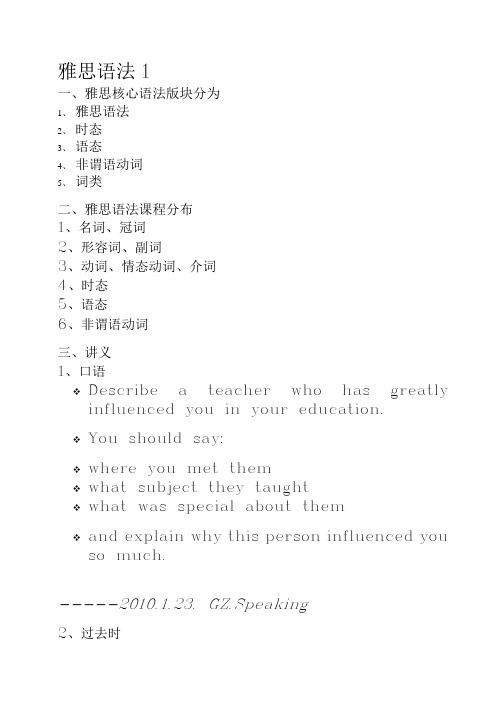
雅思语法1一、雅思核心语法版块分为1、雅思语法2、时态3、语态4、非谓语动词5、词类二、雅思语法课程分布1、名词、冠词2、形容词、副词3、动词、情态动词、介词4、时态5、语态6、非谓语动词三、讲义1、口语❖Describe a teacher who has greatly influenced you in your education.❖You should say:❖where you met them❖what subject they taught❖what was special about them❖and explain why this person influenced you so much.-----2010.1.23. GZ.Speaking2、过去时❖一般过去时❖过去进行时❖过去完成时❖过去完成进行时❖一般过去将来时❖过去将来进行时❖过去将来完成时❖过去将来完成进行时3、听力❖Engine Type: 1.4 liter(s)?-------Cambridge5/Test3/Listening4、名词:名词的数❖所有单位名词均为可数名词,均有单数,复数之分.❖1.4 liters=1.4-liter5、写作❖The development of technology changes the way people interact with each other.❖In which way does it change the types of relationship that people make?❖Does it have positive or negative effect on the development?---- 2009.8.8 Writing.Task2❖在互联网发明之前,家庭成员之间的关系亲密。
Family members had a close relationship with each other before the invention of Internet.----一般过去时❖新的媒体正在出现。
雅思重点词汇与语法
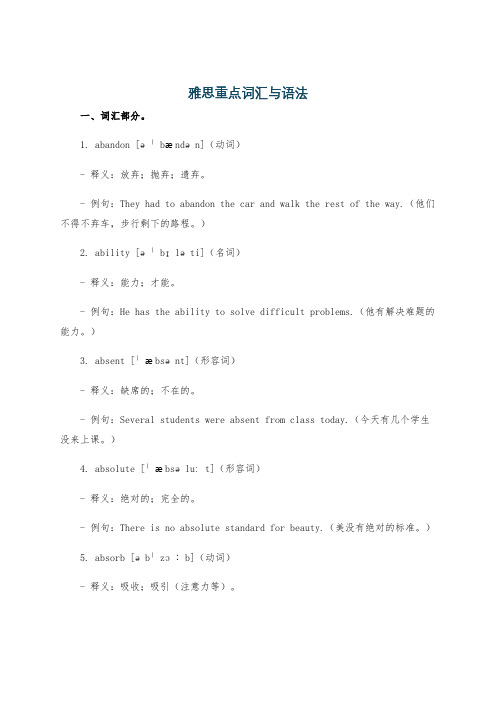
雅思重点词汇与语法一、词汇部分。
1. abandon [əˈbændən](动词)- 释义:放弃;抛弃;遗弃。
- 例句:They had to abandon the car and walk the rest of the way.(他们不得不弃车,步行剩下的路程。
)2. ability [əˈbɪləti](名词)- 释义:能力;才能。
- 例句:He has the ability to solve difficult problems.(他有解决难题的能力。
)3. absent [ˈæbsənt](形容词)- 释义:缺席的;不在的。
- 例句:Several students were absent from class today.(今天有几个学生没来上课。
)4. absolute [ˈæbsəluːt](形容词)- 释义:绝对的;完全的。
- 例句:There is no absolute standard for beauty.(美没有绝对的标准。
)5. absorb [əbˈzɔːb](动词)- 释义:吸收;吸引(注意力等)。
- 例句:Plants absorb carbon dioxide from the air.(植物从空气中吸收二氧化碳。
)6. abstract [ˈæbstrækt](形容词/名词)- 作为形容词:抽象的。
- 例句:This is an abstract concept that is difficult to understand.(这是一个难以理解的抽象概念。
)- 作为名词:摘要;抽象派艺术作品。
- 例句:Please write an abstract of your paper.(请写一篇你的论文摘要。
)7. abundant [əˈbʌndənt](形容词)- 释义:丰富的;充裕的。
- 例句:There is an abundant supply of fresh water in this area.(这个地区有充足的淡水供应。
05雅思写作考试常用语法(翻译版)

英文写作基础知识I 英语的句子成分1. 主语1)父母应该为年轻人提供机会让他们锻炼自己的能力和天赋。
2) 对于它们,我们既不能过高估计也不能否认其存在。
3) 吸烟只是一种个人爱好和娱乐。
4) 很难有定论。
5) 很明显,穿校服会使得校园生活变得乏味单调在过去的几年中,随着经济的迅速发展,越来越多的父母在把孩子送到国外学习。
大学毕业生的就业形势越来越不乐观。
毫无疑问,不同人甚至不同的大学都会对此有不同观点。
2. 谓语1)他们坚持认为审查制度应当废止。
2)孩子应当靠自己的努力获取成功。
3)广告增加了商品的成本。
4)换句话说,电脑影响了人们的日常生活,对人们有害。
5)当前,越来越多的人同意吸烟是一种不健康的嗜好,等同于自杀。
大学中的教师教授拥有丰富的专业知识和丰富的教学经验,会教给学生新的知识并引导他们解决现实中的问题。
3. 表语1)审查制度是对言论自由的一种违犯。
2)放养涂在这些动物的方法经常是野蛮残忍的。
3)谈恋爱耗费时间,经常会使学生偏离他们的主要任务---学习。
4)我们所需要做的是告诉孩子如何正确的解决这些问题。
5)他们所强调的是那些正式的考试对不利于培养学生的创造力。
大学毕业生自身也对这种局面负有责任。
由于不同的习惯和不同的价值观,人们在和陌生人同住时会觉得不自在。
4. 宾语1)垃圾食品对人的健康有害。
2)你甚至开始把工作带回家做并且一直工作到凌晨3)研究表明吸烟和肺癌、心脏病等严重疾病之间存在着必然联系。
4)它给我们带来了许多欢乐和乐趣。
5. 定语1)很难有定论。
2)近年来,因特网以极快的的速度越来越受欢迎。
3)资金不足的人们通常正确确定优先考虑的事情:他们在买奢侈品之前首先买必需品。
4)那些强烈反对这种做法的人说这违犯人工作的基本权利。
6. 状语1)户外活动能极大促进我们的健康。
2)根据法律,广告必须是完全真实的健康的。
3)为了赶走孤独和消磨时光,他们可以培养其它的爱好,比如养花、集邮和学画画。
30个常用的雅思写作高分句型总结
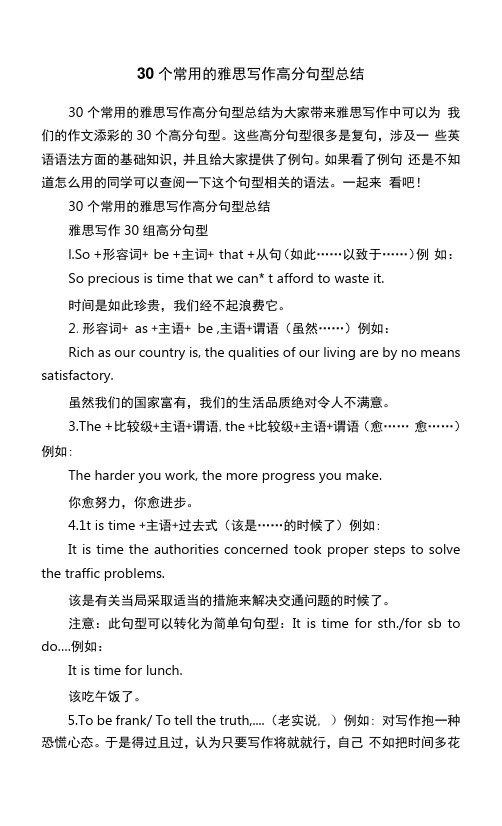
30个常用的雅思写作高分句型总结30个常用的雅思写作高分句型总结为大家带来雅思写作中可以为我们的作文添彩的30个高分句型。
这些高分句型很多是复句,涉及一些英语语法方面的基础知识,并且给大家提供了例句。
如果看了例句还是不知道怎么用的同学可以查阅一下这个句型相关的语法。
一起来看吧!30个常用的雅思写作高分句型总结雅思写作30组高分句型l.So +形容词+ be +主词+ that +从句(如此……以致于……)例如:So precious is time that we can* t afford to waste it.时间是如此珍贵,我们经不起浪费它。
2.形容词+ as +主语+ be ,主语+谓语(虽然……)例如:Rich as our country is, the qualities of our living are by no means satisfactory.虽然我们的国家富有,我们的生活品质绝对令人不满意。
3.The +比较级+主语+谓语,the +比较级+主语+谓语(愈…… 愈……)例如:The harder you work, the more progress you make.你愈努力,你愈进步。
4.1t is time +主语+过去式(该是……的时候了)例如:It is time the authorities concerned took proper steps to solve the traffic problems.该是有关当局采取适当的措施来解决交通问题的时候了。
注意:此句型可以转化为简单句句型:It is time for sth./for sb to do….例如:It is time for lunch.该吃午饭了。
5.To be frank/ To tell the truth,....(老实说, )例如: 对写作抱一种恐慌心态。
于是得过且过,认为只要写作将就就行,自己不如把时间多花在听力和阅读上来帮自己〃拉分〃。
雅思写作冲刺之:写作语法及必备句型汇总

雅思写作冲刺之:写作语法及必备句型汇总雅思写作冲刺之:写作语法及必备句型汇总1雅思常用语法时态雅思写作常用时态:一般现在时,现在进行时,现在完成时,一般将来时 1.一般现在时:表示通常性、规律性、习惯性、真理性的状态或者动作:谓语动词用第三人称单数例如:① 打工对一个人的将来的事业有深远的影响。
(过去现在未来都有影响,客观,单数)Taking part-time jobs e某erts profound impacts on one’s future career.② 国际旅游业促进经济发展。
(过去现在未来都促进,客观,单数)International tourism promotes the economic development.2.现在进行时:表示正在进行的动作或存在的状态。
现在进行时表示动作发生的时间是“现在”,表示逐渐的过程is developing rapidly/dramatically.3.现在完成时:1.表示结果和影响,一般表示变化大,发展了 2. 表示过去的动作或状态持续到现在注意常用搭配:In recent years, In the past decades…例如:① 最近几十年期间,世界发生了巨大的改变。
In the past decades, dramatic changes have taken place in the world.② 最近几年,科技极大的改变了人们的生活。
In recent years, technology has reshaped people’s life.③ 犯罪率已经急剧上升了。
The crime rate has increased sharply.4.一般将来时:表示将来某一时刻的动作或状态:will do例如:电脑将会在教育过程中起越来越关键的作用,但是它们绝对不能在教室中取代老师的地位。
Computers will play an increasingly critical role in education, but it is not possiblethat they could replace teachers in the classroom. / but it is impossible for them to replace teachers in the classroom.在了解了雅思基础语法之后,我们来看雅思写作中有哪些常见必备的句型,除了简单句,考生们还需要运用哪些高分句型来博得考官好感?雅思写作必备句型2:简单句1.简单句:主流句型,主要结构会使用,足矣!(1).主谓(宾, 可有可无)例如:人们在这个问题上的观点不一样。
雅思写作题型36个必背句式

雅思写作题型36个必背句式在备考雅思的过程中,雅思写作是大家认为最难的题型。
要想提高自己的雅思写作能力,平时的积累必不可少。
下面是小编整理的雅思写作题型36个必背句式,欢迎大家阅读分享借鉴。
雅思写作题型36个必背句式1.It作先行主语和先行宾语的一些句型She had said what it was necessary to say.2.强调句型It is not who rules us that is important, but how he rules us.3."All+抽象名词"或"抽象名词+itself"(very+形容词) He was all gentleness to her.4.利用词汇重复表示强调 A crime is a crime a crime.5."something(much)of"和"nothing(little)of" "something of" 相当于"to some extent",表示程度。
在疑问句或条件从句中,则为"anything of ",可译为"有点","略微等。
""译为毫无","全无"。
"much of"译为"大有","not much of"可译为"算不上","称不上","little of"可译为"几乎无"。
something like译为"有点像,略似。
" They say that he had no university education, but he seems to be something of a scholar.6.同格名词修饰是指of前后的两个名词都指同一个人或物,"of"以及它前面的名词构一个形容词短语,以修饰"of"后面的那个名词。
- 1、下载文档前请自行甄别文档内容的完整性,平台不提供额外的编辑、内容补充、找答案等附加服务。
- 2、"仅部分预览"的文档,不可在线预览部分如存在完整性等问题,可反馈申请退款(可完整预览的文档不适用该条件!)。
- 3、如文档侵犯您的权益,请联系客服反馈,我们会尽快为您处理(人工客服工作时间:9:00-18:30)。
雅思常用语法总结
雅思考试中常用的语法总结如下:
1. 时态:包括一般现在时、一般过去时、现在进行时、过去进行时、将来时、过去将来时等。
时态的正确使用是非常重要的,特别是在写作和口语表达中。
2. 被动语态:被动语态用于强调动作的接受者和动作的重要性。
被动语态的形式为“助动词be + 过去分词”,常用的助动词有am, is, are, was, were等。
3. 条件句:条件句用于表达假设、可能性、推测等。
包括三种类型:零条件句(零条件句表示一般事实)、一般条件句(表示现在或将来的情况)、虚拟条件句(表示与现实相反的假设或不可能实现的情况)。
4. 从句:从句是一个句子中的一部分,具有主语和谓语,可做其他句子的主语、宾语、状语等。
常见的从句包括名词性从句(作主语、宾语、表语等)、定语从句(修饰名词)、副词从句(修饰动词、形容词、副词等)。
5. 并列结构:并列结构用于连接两个或多个相同重要性的句子,可以使用连词and, but, or等。
并列结构使句子更加流畅和有
逻辑性。
6. 符合最佳用法:在雅思写作中,使用符合最佳用法是非常重要的。
这包括使用适当的连接词、平衡句子结构和长度、使用
多样的句型和长句,并在表达观点时提供足够的支持和证据。
7. 倒装句:倒装句的语序颠倒是为了强调特定的信息或实现平衡和连贯。
常见的倒装情况包括完全倒装(谓语动词位于主语之前)、部分倒装(助动词位于主语之前)和否定倒装(否定词位于句首)。
8. 间接引语:间接引语用于转述别人的话或思想。
常见的引述动词包括say, tell, ask等。
在使用间接引语时,需要注意时态的转换和引号的使用。
这些是雅思考试中常用的语法要点总结,合理运用这些语法规则可以提高语言表达的准确性和流利度。
同时,还需要多加练习,掌握常用的语法用法。
